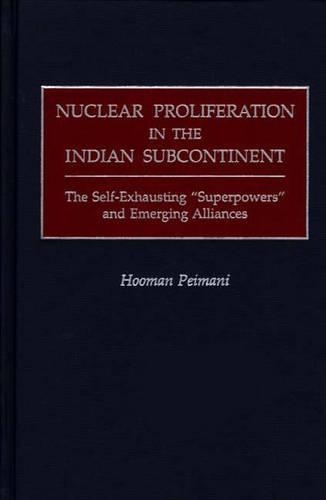
Nuclear Proliferation in the Indian Subcontinent: The Self-Exhausting Superpowers and Emerging Alliances
(Hardback)
Publishing Details
Nuclear Proliferation in the Indian Subcontinent: The Self-Exhausting Superpowers and Emerging Alliances
By (Author) Hooman Peimani
Bloomsbury Publishing PLC
Praeger Publishers Inc
30th August 2000
United States
Classifications
Tertiary Education
Non Fiction
International relations
355.8251190954
Physical Properties
Hardback
168
Description
The main impact of the May 1998 nuclear tests of India and Pakistan was not on the nuclear nonproliferation regime, Peimani asserts, but on the structure of the international system. The tests could not encourage massive nuclear proliferation as many "natural" factors prevent such a scenario, but they surely contributed to the weakening of the mainly American-dominated international system. The failure of nuclear India and Pakistan to achieve their objectives has increased their dissatisfaction with a system which they see as discriminating against them on the grounds of their insignificant nuclear arsenals and their severe underdevelopment. Given their limited resources, their attempts to deal with these problems in the near future and, in particular, to develop credible arsenals would be self-exhausting and not feasible. Their failure has turned them into dissatisfied regional powers who are being pushed toward forming alliances with their long-term friends, Russia and China, respectively. Each has strong reasons for dissatisfaction with the American system, which is marginalizing them. Their concerns about common enemies and threats as well as their economic and political needs are pushing these states toward the formation of tacit or official alliances. Decades of friendship and extensive ties make them "natural" allies and encourage the formation of an alliance between India and Russia on the one side, and China and Pakistan on the other.
Reviews
Pemani's book will contribute to our understanding of the significance of the nuclear rivalry between India and Pakistan in South Asia and beyond.-The International History Review
"Pemani's book will contribute to our understanding of the significance of the nuclear rivalry between India and Pakistan in South Asia and beyond."-The International History Review
Author Bio
HOOMAN PEIMANI is an independent consultant who works with international agencies in Geneva and does research in international relations. His earlier research and writing has centered on the Persian Gulf, the Caucasus, and Central Asia. Earlier publications include Regional Security and the Future of Central Asia: The Competition of Iran, Turkey, and Russia (Praeger, 1998) and Iran and the United States: The Rise of the West Asian Regional Grouping (Praeger, 1999).
